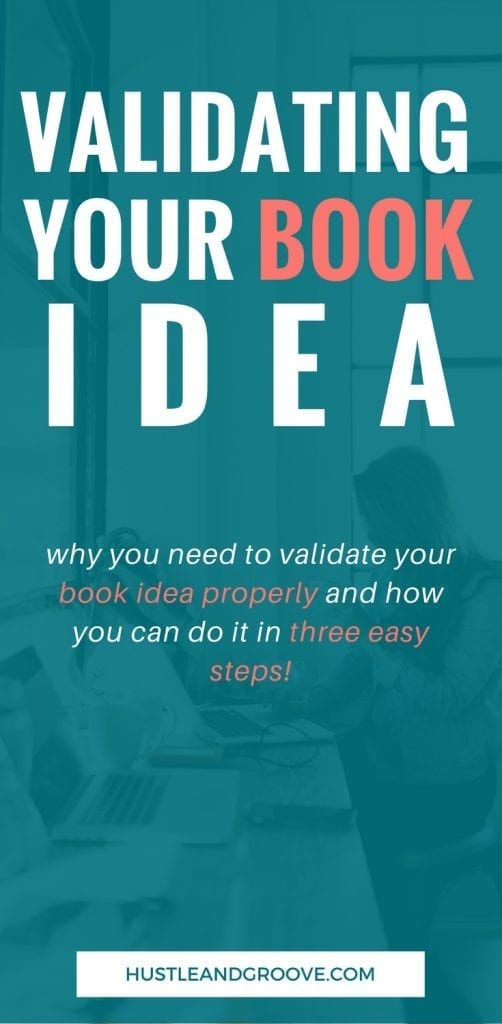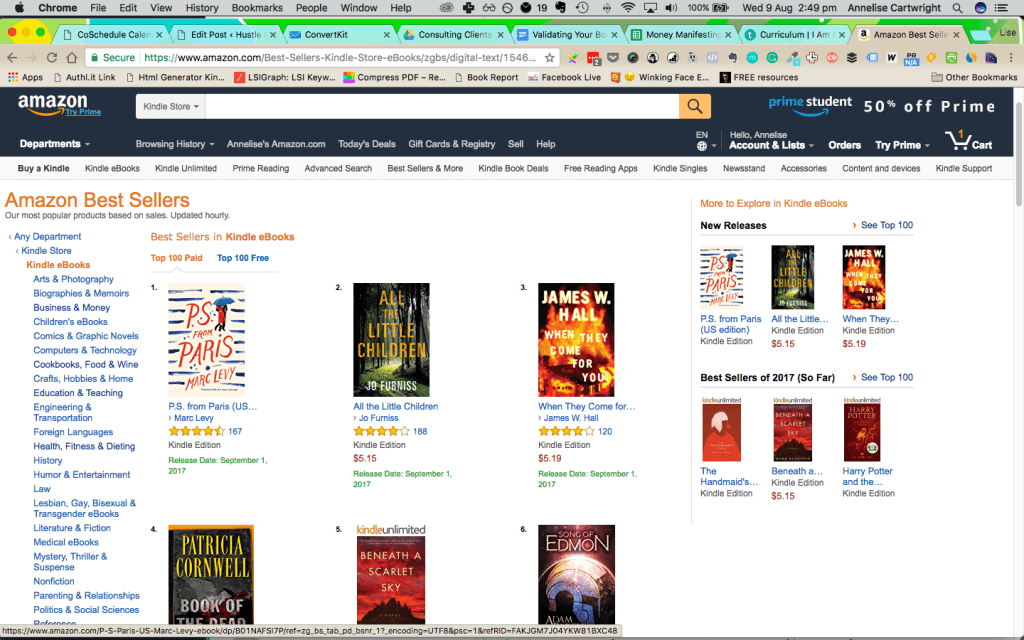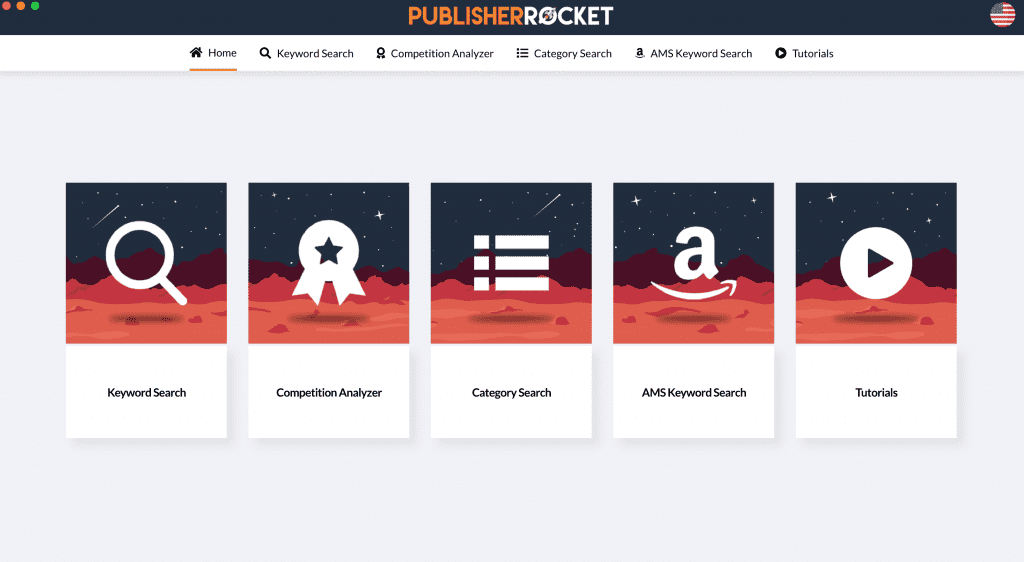Validating your book idea seems like it should be an easy feat, right? I mean, you've already got the book idea, that's the hardest part.
Surely validating your book topic should be easy… ah, no, unfortunately, it can be quite a daunting task, particularly if you've never had to do this.
I mean, you're an author, not a marketer, right? Why do you even need to validate your book idea?
Well, my friend. Here's why: without validating your book idea properly, you could spend your time, money, and effort and get absolutely NO return. Meaning, no-one is interested in your book.
[Tweet “Without validating your book idea, you could lose money and time…”]
Let's hear a little story…
Back in late 2013, I decided that it was time to write a book. I had been thinking about it for a while, stalking Steve Scott and Nathan Barry. I thought “If they can do it, so can I”.
Why did I want to write a book? Because I had heard it was a great way to increase your income buckets, and I was all about diversifying my income. And I had a BRILLIANT idea for a book.
I mean, what better way to put a stamp on my authority in the freelance writing niche than to write a book about how I had used oDesk (now Upwork) to find my clients and quit my job in 2012…?
So I got to writing. It took me about three months to write this first book, as I was balancing it in between my full-time freelance writing clients.
I had the greenest cover designed, to fit in with oDesk's branding. I created an awesome sales page, got testimonials and told lots of people about my new book.
I didn't publish it on Amazon. No. I didn't really know much about Amazon then. Instead, I decided that I'd sell my book on my website, aptly named at the time, Outsourced Freelancing Success.
November 2013 came around. I hit publish on my sales page, converted my MS Word book into a PDF document, had my cover converted to a pretty 3D book and launched.
Super proud!
Until… the only people that purchased my book were friends and family. I had no idea how to market my book, so I wasn't getting much traffic.
I considered putting the book on Clickbank, because that seemed like a good idea (and what a lot of goo-roo's were touting you should do), but freaked myself out at the affiliate side of it all.
By January 2014, I was lucky if I had one sale a month.
Fast forward to July 2014.
I remember sitting at my desk in my tiny office in our old apartment in Auckland, New Zealand. I was in the middle of a client project that was so boring, I was literally killing my eyeballs with the words I was typing.
Ding. My email notification sound went off on my laptop. The email slid across the top, right-hand corner of my screen and I caught a bit of the title, “Write a book and publish on Amazon…”
Intrigued, I clicked on my email program and opened the email. Inside was a link to a live Google Hangout where a couple of young guys were chatting about self-publishing on Amazon and how they had had all this success with just one book.
I watched the last 10 minutes of that hangout and decided that I wanted to join their training program.
If you've not heard by now, the program I'm talking about is Chandler Bolt's Self-Publishing School.
It changed my life.
After joining SPS, I was excited to get started. On my first 1:1 coaching call with Chandler, we talked about what book I was going to write.
I remember saying something like, “Oh I already have a book idea. It's actually a book I've already written and I want to convert it and publish it on the Kindle platform.”
Chandler, in his nicest southern drawl, was like, “Lise, I think you should write something new so that you can take the most out of this learning process. But, let's run your current book through the validation process, just so we can see if it's even a viable idea.”
The result of that validation process?
Crickets. Like, no chirping at all. NO-ONE was looking for information about freelance writing on oDesk.
In fact, the results were so bad, that I promptly unpublished the sales page for that book and got straight into starting from scratch.
I'll say it again. If you don't validate your book idea properly, you run the risk of putting all this time and effort (and money!) into a book that just doesn't work on Amazon.
Ok, let's jump into validating your book idea. Because that's what you're here for, right?
Table of Contents
 Validating Your Book Idea: How to Know if it's Going to Work
Validating Your Book Idea: How to Know if it's Going to Work
The following process is the one I follow (and teach inside my 1:1 coaching program, I AM an Author) for each book I'm thinking about writing.
Here's the CliffsNotes version:
- Reviewing Amazon to see if books exist
- Visit Udemy to see if courses exist
- Visit Skillshare to see if courses exist
- Google to see if websites exist
- Use KDPRocket for final validation
Cool? So you're good to go, right?
LOL, I can hear your scream from here. Ok, enough playing around, let's get into the nuts and bolts of validating your book idea.
Step 1: Review Amazon
No matter what your book idea is, the first place you should start your validation is on Amazon, particularly if you're going to use this as your publishing platform.
Start by navigating to Amazon, then the Kindle eBook Store. From there, you want to make sure you locate the best sellers and also make sure that you can see the Kindle categories on the left-hand side.
[Tweet “No matter what your book idea is, the first place you should start your validation is on Amazon”]
Start by browsing the categories that your book topic might fit into. Make sure that you're always looking at the best sellers.
What you're looking for are books that are similar to your book topic. That doesn't have to be exactly the same, but in the general niche that your idea is in.
Found 5+ books? Awesome, you can continue with the rest of the process.
[feature_box_creator style=”1″ width=”700″ top_margin=”5″ bottom_margin=”5″ top_padding=”5″ right_padding=”” bottom_padding=”5″ left_padding=”” alignment=”center” bg_color=”#75d7e1″ bg_color_end=”#0eb9cb” border_color=”” border_weight=”” border_radius=”” border_style=”” font_size=”14″ font_font=”Montserrat” font_shadow=”none”]
Not finding your book topic anywhere? Then it might not be a good fit for Amazon. Consider either niching down further or refining your idea. Perhaps you need to approach it from a different angle?
For example, using my freelancing writing on oDesk book idea, I brainstormed and came up with my book, Side Hustle Blueprint: How to make an extra $1000 per month without leaving your day job!
[/feature_box_creator]
Now that you've got a few books that are similar to your book topic or niche, it's time to refine things further and start validating your book idea.
The next part of this process is to look at the following for each book you've found:
- What is the book's sales rank?
- What are the average monthly sales?
How do you find this information? You start by clicking on each book and scrolling down to the “product details” area on the sales page. You'll be able to see the Amazon Best Sellers Rank (ABSR) as well as the rank in the categories the book is in.
Note down the ABSR number and also the category and category ranks for each book.
Ideally, what you're looking for are books that rank between 10,000 – 30,000 in the ABSR.
The category information is handy to have when you're getting ready to publish your book.
To find out the average monthly earnings for each book, take the ABSR number for each book and plug them into the Kindle Best Seller Calculator kindly supplied by Dave Chesson from Kindlepreneur.
[Tweet “Ideally, what you're looking for are books that rank between 10,000 – 30,000 in the ABSR.”]
This will tell you how many sales the book is making each day and then from there, you can work out the average sales based on the book's price x daily sales x days in a month.
Here's an example:
Say a book you're looking at has an ABSR of 24,356. Using the KBSC, you can see that this book gets about 11 sales per day. The book is priced at $2.99.
$2.99 x 11 x 30 = $986.70
This gives you the average monthly sales. You can take it one step further and work out what the author's royalty payment would be based on the fact that Amazon provides 70% commission on books priced $2.99 – $9.99.
70% of $986.70 = $690.69.
This book is not doing too badly and the author is certainly recouping their publishing costs at this point.
Rinse and repeat for each book you've found.
The goal here is to see if your niche is profitable and to make sure that the books are making at least 5 sales per day.
At this point, you could be fairly confident that your book idea is valid, but I like to validate further.
Step 2: Online Courses
The next part of the process is to check to see if there are any online courses on your book topic.
I head over to Udemy.com and Skillshare.com to see what's available. This is also a great way to find more ideas to include in your book and check the reviews for any gaps that your book could fill.
If I find 5 or more courses on both platforms, I'm confident to move forward with writing the book.
I'll also save the links to each course so that I can research them further, and look at how they've created the course. Then I can decide whether my book will convert into a course as well, later on down the track.
[Tweet “Book Validation: Check to see if there are any online courses on your book topic.”]
Step 3: Google It
If you're familiar with keyword research, you'll know how important it is to check Google too.
This part of the process is really just to confirm that your book idea has ‘legs' beyond Amazon…
Why would you want to know this?
Well, if you're looking to build a solid author business, you'll want to diversify your income at some point. By confirming that people are also interested in your book topic outside of Amazon, you'll be able to create more content and products.
Head to the Google Keyword Planner Tool. You'll need a Google Adwords account to access this. It's free, so go ahead and create one if you don't have one.
Once logged into Google Adwords, head to the Adwords toolbar at the top and click on “Tools” — you should see the Keyword Planner option in the dropdown.
Choose it and then choose the first option “Search for new keywords using a phrase, website, or category”.
Enter your book topic idea into the first text box and then click “Get Ideas”. The tool will produce a whole bunch of keywords and relevant data.
What you're looking for is the data on your initial book idea and then on the other keywords provided.
The two data points we want to focus on are the Avg. Monthly Searches and the Competition.
The bid doesn't matter because we're not creating ads here.
Download the data to a CSV spreadsheet and then sort the data by searches (highest to lowest).
The competition information will be translated into numbers, with 1 being the most competitive and 0 being the lowest.
What you're looking for is high monthly search results (anything over 500 is great) with low competition. This would be anything below 0.30.
Medium is 0.31-0.60 and High competition is 0.61 – 1.
Ideally, for your book topic idea, it would be great if you had high searches and low-medium competition.
Save this information for later!
Ok, are you still with me? By now, you might be thinking to yourself, “Surely there's a faster, better way?”
And you'd be right!
Enter Publisher Rocket!
[Tweet “By now, you might be thinking to yourself, “Surely there's a faster, better way?”]
Step 4: Research Validation Tools
If you're strapped for time or cannot stand spending all this time on validating your book idea, then you'll love Publisher Rocket.
As a beta tester, I fell in love with Dave's tool. Not only will it breeze through the process of validating your book idea, but it will also help you identify the best keywords to use in your book description and KDP submission.
It will also help you ‘stalk' your competition and find out, very quickly, just how profitable your book topic is going to be.
If you grab Publisher Rocket, watch the tutorial videos closely as Dave delves quite deeply into the keyword and competition areas, which further validate your book ideas.
Publisher Rocket also provides Google search results, so you can skip the step above as well.
My personal Publisher Rocket software review is that this tool is completely necessary if you are going to go all-in on your author business.
If you're just getting started, using the steps I've outlined above, will allow you to get the information that you need.
The reason I love Publisher Rocket a little more than most is because I also use it to help me look for additional keywords for blog post topics. Those Google results are super handy and one of the more underutilized features, in my humble opinion.
A new feature that has been recently added to Publisher Rocket is research for your Amazon Marketing Services ads. This feature alone is worth the price of Publisher Rocket plus you'll get all future updates and additions for free.
Like I said, if you're serious about your author business, you'll wanna check out Publisher Rocket.
Dave provides a ton of training videos for using Publisher Rocket as well as an AMS course on how to find the right keywords for your ads. If you're interested in learning more about the Amazon advertising platform, Dave's course is a MUST. Oh yeah, it's also FREE 🙂
[Tweet “If you're serious about your author business, you'll wanna check out Publisher Rocket.”]
Next Steps
Now that you know how to validate your book topic, and you know that it's going to work, all that's left to do is write your book.
Don't make the mistake I made and skip the validation process. It's a painful realization that no one wants your book. If I can help you avoid that pain, I'll happily do that.



24 replies to "How to Know if Your Book Idea is Going to Work"
I am nearly done with a children’s story so I am not sure how I would validate that. Interesting though. I am going to use this for my ebooks I am writing to sell on my blog. Awesome information Thank you
Hi Dagne, the process is similar. You would look at the category your children’s book fits into the most and see if there were similar books already written. KDP Rocket would be a great asset in this instance, as you’d be able to check competition and quickly see similar books. Yes, this process is perfect for the e-books you’re selling on your blog too 🙂
This post has so many useful and informative resources that I don’t know how to begin! This was great information.
Thanks Christine, I hope it hasn’t overwhelmed you. Start at step 1 and go from there 🙂
Very useful and very interesting! Thx.
I’m glad you enjoyed Salva 🙂
I’m definitely going to check out that school. I have two book ideas in my head that I have been sitting on for two years and gave myself a deadline to write the first draft by year’s end. I’ve been participating in a daily writing challenge to keep me motivated.
Hi Courtney, make sure you do check out the school, it’s definitely a great way to get your first book written because there’s accountability. Start now and you will have that first draft done by the end of the year and actually published!
I actually just recently decided to write a book. This post definitely gave me a lot to think about haha thank you
I’m glad Al, it’s really important not to skip this part of the process. If you want your book to make you money, then you need to validate it. If you’re just writing it for passion and not profit, then you can safely ignore this advice 🙂
Yes, yes, and yes! I am a writer my whole life and I really get stuck sometimes. Many things on mind… This is so helpful!
I’m so glad you found it helpful Miljana, honestly, it makes the process of writing a book so much easier when you know there’s an audience!
Great informative article, it can be such a maze trying to publish!
Thanks for your comment Sophie, it can be a maze if you’ve never done it before.
Great article! I don’t know if I could ever write a book I feel like it would be so time-consuming but if that’s what you are passionate about then I say go for it! I did have several friends who wrote books and had the same issue where only friends and family were buying them but I don’t think they put a lot of time or effort into marketing themselves either
I’m sure you could write a book Erica, and it’s not as time-consuming as you’d think. It’s about scheduling in writing time and being consistent and then yes, you have to market your book, otherwise how will people know about it?! Good luck 🙂
I’ve thought about this for blogs but never to applying it in so much depth to a book! it definitely makes sense. Thanks for sharing!
Yeah, it makes complete sense to apply it to anything you’re thinking about making a living from. Why waste your time and effort on something unless you know it’s got an audience willing to buy?! 🙂
How can I apply these ideas to validating works of fiction? I have outlined or drafted novels in different genres but then I run out of steam. The thought of doing all the marketing for a book no one wants to buy is depressing, even though I enjoy the writing. Can you recommend any books or courses that focus on validating fiction?
Just as a by-the-way, my wife and I spent all of last March in New Zealand. We took trains, planes, cars, and boats all over both North and South Island. Every site was a wonder and every stranger was a new friend.. Things got a little exciting at the end, though.
Hey Robert, thanks so much for your questions. Fiction is a little different in terms of validating… it’s more about making sure that 1) your genre is one that is making money on Amazon (you can check that inside Publisher Rocket by checking out books that you consider your competition) and 2) that your book hits all the expected tropes for the genre. I’d highly recommend reading ALL of Chris Fox’s books on writing fiction. There is a formula for it… if you want to make money. If you don’t care about the money, then you write what you love!
I’m glad you were able to visit NZ! We are heading back to Australia (my hubby is Australian) in 3 weeks! Need more sunshine 😉
Now I’m thinking about writing a book for students. I’m happy to see some prompts from you. I guess everyone needs to have a good start! 🙂
Hey Lily, yay for writing a book! We all have to start somewhere and this will definitely help you start off the right way. I hope it helps!
Good post guys!
Glad you enjoyed it